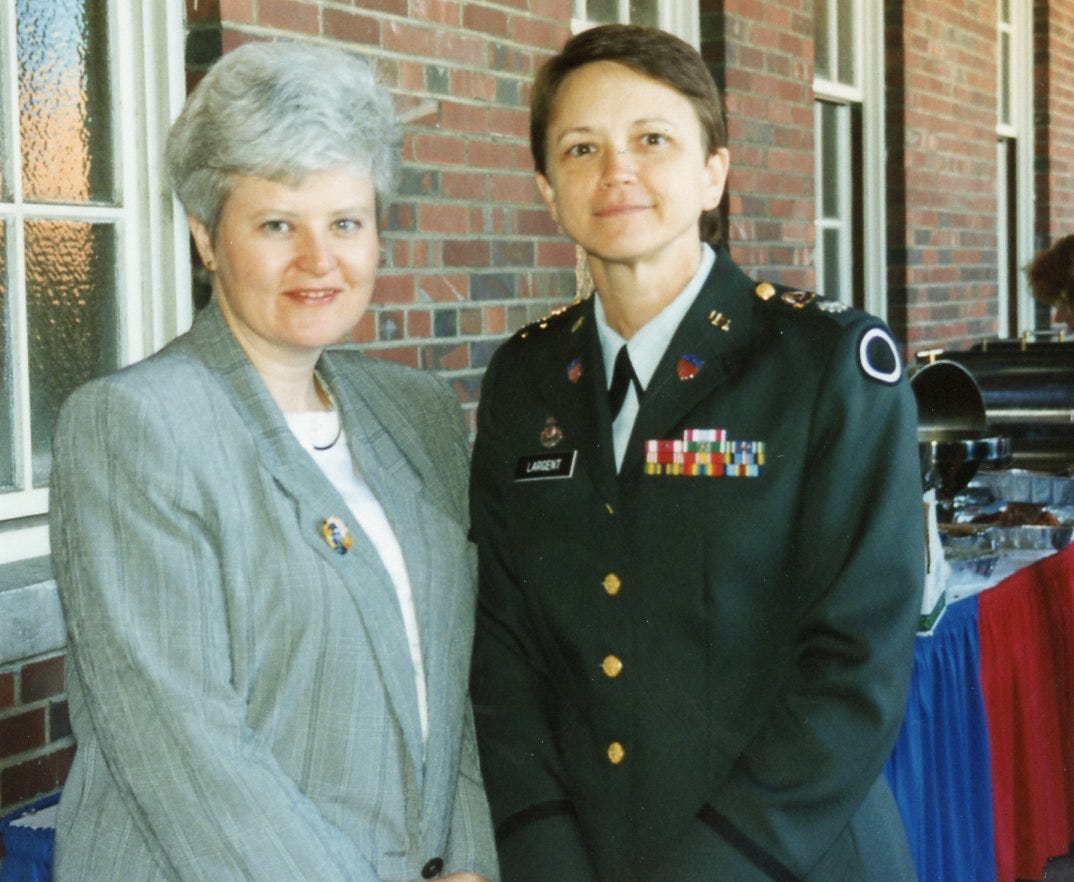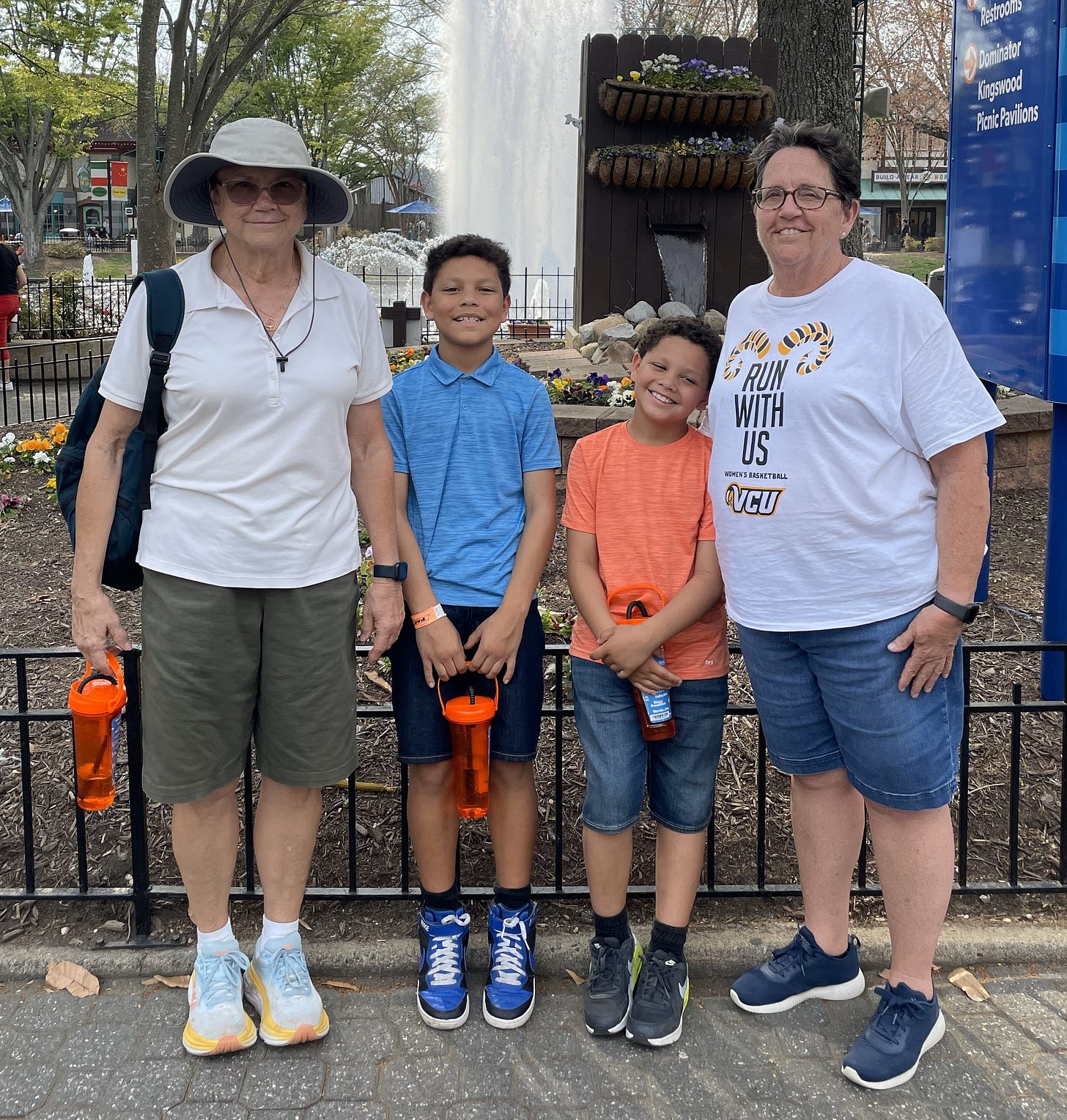As I walked into the room, I watched Regina pull a pair of slacks from the laundry basket, position it exactly on the ironing board, and move the hot iron over the pant leg to apply a precise crease.
“Ah, ironing day, I see,” I observed.
“Yeah, Jeanne’s leaving for Boston tomorrow, so I’m getting her packed,” Regina replied as she flipped the pants around and pressed down on the other leg.
If I hadn’t known better, I could have interpreted this scene as one in which a stereotypical minister’s wife works quietly behind the scenes in service to her spouse. That reading couldn’t have been further from the truth.
Yes, I first met Regina as the late Rev. Jeanne Pupke’s wife, and yes, Jeanne was a strong presence—the kind of person who easily captivates a room without even trying. Regina, on the other hand, a practitioner of Zen Buddhism and a natural introvert, typically does not. But, as we all know, stereotypes are dangerous, especially because they often underestimate the person we apply them to.
To understand Regina’s quiet power, it’s important to know that she’s a retired Army Colonel. She couldn’t have achieved that rank unless she was goal-oriented, diligent, and open, with a strong sense of duty—in other words, a leader. Regina exemplifies leadership in everything she does. She’s a take-charge kind of woman.

Just before her retirement from management at the business school of a local university, Regina co-shepherded her department through its national accreditation process. At home, she mows her impeccable lawn into chevron stripes, keeps the house immaculate, manages the household budget, does the taxes, and presses sharp creases into any pants that require them. In other words, whether at work or at home, she gets things done.
After her wife died suddenly in 2022, Regina took on yet another important leadership role. It had been Jeanne’s dream to assist with parenting two of Regina’s grandnephews, both under the age of ten. The boys were being raised in Florida by their grandmother, Renee, who had to work full-time to support the household.
After Jeanne’s retirement, Jeanne and Regina had planned to move to Florida so the boys could move in with them. Tragically, Jeanne died just months before she was due to retire. That left Regina with a difficult and life-changing decision, but one her sense of duty called her to make.
Three months after her wife’s death, Regina, who was still overwhelmed by grief and just beginning to see relief from the tedious paperwork and financial drudgery required when a spouse dies, said to me, “I invited Renee and the boys to come live with me. They’re moving here in July.”
“Wow! That’s a big deal!” I said, not hiding my surprise.
“Yeah, well, it will allow Renee to retire and focus on the boys. It’s the best thing to do.”
“Is that what you want to do?” I asked, concerned that she hadn’t had enough time to process her identity as a single person.
“It’s what Jeanne wanted, and I want to do it for her,” she replied. Regina saw it as her duty to continue her commitments to her spouse, and nothing would stop her from fulfilling her duty.
Two months later, a household that had consisted of two elder women, both with their focus on Jeanne’s upcoming retirement, was transformed into a bustling home with Regina’s newly retired sister and two rambunctious boys, ages eight and nine.
Over the course of the past year, Regina and Renee have figured out what co-parenting looks like. As any parent knows, this is no easy task. Regina’s first year in this role has included assisting with homework, arranging for tutoring, enrolling the boys in summer camps, ensuring they were equipped to participate in football, basketball, and soccer, and most importantly, teaching them how to be responsible young men. Together Regina and Renee have been uncompromising, especially in this last task.
The boys are starting to settle into their new life, one that, with two full-time guardians, incorporates considerably more structure and discipline than they were used to. And the boys are making progress, albeit more slowly in some areas than Regina and Renee might want.
As I’ve watched Regina model a sense of duty over the years, one that made her an invaluable minister’s wife, an industrious employee, a steadfast friend, and now a caring guardian to two growing boys, I’ve carefully evaluated what duty means to me. I’m aware that I don’t have the same level of discipline that Regina does, so when I find myself slacking off or giving up on something, I look to Regina for inspiration and a renewed appreciation of duty.
Next post:







Very well said and written.
Wow! Just wow!